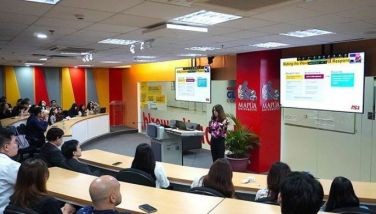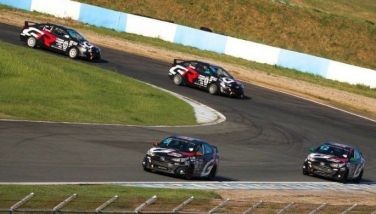Final arbiter

Of course the Supreme Court will have the final say on whether or not Grace Poe is qualified to run for president, or even whether she can sit in the Senate.
Which raises the question: why bother with the Commission on Elections (Comelec) and electoral tribunals when everything will end up with the Supreme Court anyway? After exhausting the process of appeal, either the petitioner or the respondent will go to the SC. Why prolong the process?
The Comelec is a constitutional body that’s supposed to be independent. Yet all its rulings and policies can be overturned by the SC – which the high tribunal has done in numerous cases involving the party list, premature campaigning, spending limits, and now even the “no biometrics, no vote” program.
Thanks to the SC, the party list is no longer just for marginalized sectors or representatives. Instead it is just another vehicle for major political parties, religious groups and poorly regulated non-government organizations to inflict their representatives on already heavily burdened taxpayers.
We have politicians who are officially candidates after filing their certificates of candidacy, and we have an official campaign period. But there is no such thing as premature campaigning, according to the SC. And the sky’s the limit on spending for self-aggrandizing political advertisements that only the SC cannot see as campaigning.
Now a division of the Comelec has disqualified Poe from the presidential race. There are three other similar petitions pending in another division, and the commissioners handling the cases may have a different opinion on Poe’s citizenship and residency, according to a Comelec official. Why weren’t the petitions consolidated?
In any case, Poe must follow the process and “exhaust all legal remedies” first, meaning she must wait for all the petitions to be resolved, and then she can bring each case to the en banc or Comelec in full session. If she is disqualified at this stage, she can ask for reconsideration. If the ruling is upheld, that’s when she goes to the SC.
The same process is expected from the petitioners if the Comelec rules in favor of Poe.
Why not just let the SC settle the issue from the start, with the Comelec simply asked to present its expert opinion during the court deliberations? It would cut the time for resolving the controversy.
Time is of upmost importance in this case. This is not just about the fate of one candidate, but the integrity of the 2016 vote and the stability of the nation.
* * *
The Comelec is not the only agency whose policies and rulings are subject to SC review and possible reversal.
Even regulatory bodies do not have the last word in their areas of coverage. The Energy Regulatory Commission, the Securities and Exchange Commission, even the Office of the Ombudsman have found their orders frozen indefinitely or overturned by the Supreme Court.
The SC has poked its nose into tax collection, price setting and even the process of crafting the national budget and raising taxes.
President Aquino, when he still had the time and energy to pick a fight with the SC, called it “judicial overreach” (the proper word is “overreaching,” an SC justice told me) and cited it as the reason why at one point he was willing to go along with amending the Constitution.
That overreach, as several retired and incumbent justices explained to me, stems from a provision in the precious 1987 Charter, which vests in the judiciary the power, among others, “to determine whether or not there has been a grave abuse of discretion amounting to lack or excess of jurisdiction on the part of any branch or instrumentality of the Government.”
Granted the judiciary has the power; can’t the courts exercise self-restraint in taking on cases? The lack of judicial restraint renders useless our regulatory bodies and emasculates the Comelec.
One day Malacañang, Congress or both, citing their independent and co-equal status with the judiciary, will resist this exercise of judicial power and we will have a constitutional crisis.
* * *
The fact that the buck does not stop with the regulatory bodies when it comes to resolving business and economic disputes is one of the biggest disincentives to foreign direct investment in our country.
Investors may not complain too much if our judicial system is swift and efficient. But Philippine courts are notorious for their glacial pace and have been criticized for inefficiency and corruption.
The SC has also raised the specter of endless litigation when it reversed its own ruling that was supposed to be final and set for execution.
Waiting for a final Supreme Court ruling on a business contract dispute can take two decades. This is the reason why the Europeans insisted that all contracts with the Philippine government must include a provision that in case of a dispute, it will go to international arbitration rather than be settled in Philippine courts.
The snail’s pace of Philippine justice is surely also the reason why there is a provision in the Visiting Forces Agreement requiring any criminal case filed in this country against an American serviceman to be resolved within one year.
In the case of US Marine Joseph Scott Pemberton, he was convicted over a year after his victim Jeffrey “Jennifer” Laude was killed, but the one year is reckoned from the date the case is filed in court.
That one year during which Pemberton was detained without bail at Camp Aguinaldo will be included in the automatic computation of his so-called good conduct time, which allows national prisoners to be freed after serving just one third of their sentence.
If the minimum sentence of six years would be applied, Pemberton could be out in one year if he loses his appeal and actually spends time in a Philippine prison.
We have many other homicide cases waiting for final resolution in courts, and a number of them are likely to reach the Supreme Court.
I can’t remember any case that was resolved as quickly as Pemberton’s. It’s not unusual for the wait for final adjudication to be longer than the actual sentence. It’s an injustice, both for the victim and the convict, and especially for the wrongly accused.
In election cases, the slow pace of resolving controversies is not only an injustice; it wreaks havoc on the vote and destabilizes the nation.
- Latest
- Trending






















